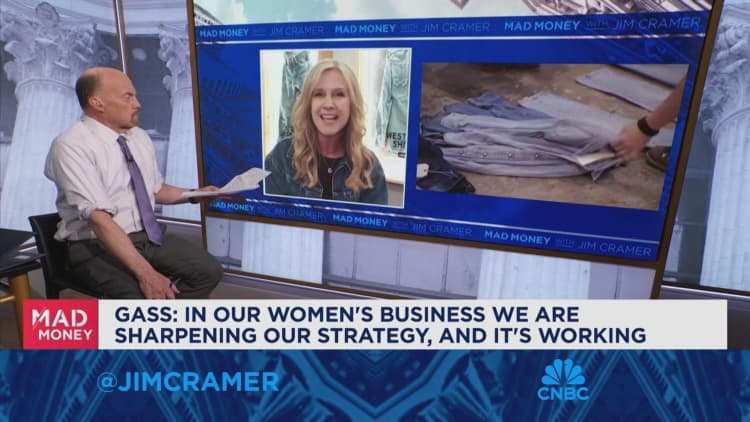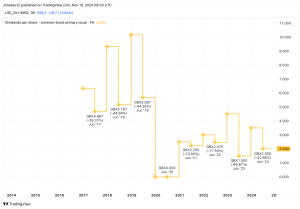- Interest in everything related to Western fashion is driving up demand for denim clothing such as skirts and dresses, according to San Francisco-based Levi Strauss.
- The frenzy comes as Western wear has gained a groundswell of cultural support that’s caught the attention of the consumers, not to mention the retailer’s chief executive and Wall Street.
In a lyric on her latest album, Beyoncé sings “denim on denim, on denim, on denim.”
Levi Strauss shoppers are taking that advice to heart. Levi Strauss executives are ecstatic.
Western wear is booming as consumers opt for top-to-bottom denim looks, the iconic, 171-year-old clothing maker said on Wednesday. As the style wins cultural favor, its popularity is juicing denim niches — like shirts, skirts and dresses — that fall outside Levi’s widely-known blue jean offerings.
“The growing popularity of Western wear is at an all-time high,” CEO Michelle Gass told analysts Wednesday night after the California-based retailer’s latest earnings report for the quarter ended in May.
A Western renaissance has been gaining traction over the past several months, sending stylish shoppers searching for pieces like jeans, boots and cowboy hats. Levi’s scored a huge hit when its jean brand was referenced in Beyoncé’s song “Levii’s Jeans,” released earlier this year.
Beyond Beyoncé’s chart-topping “Cowboy Carter” album, the increased ubiquity of Western style has also been tied to a fashion line unveiled by Louis Vuitton earlier this year and Taylor Swift’s ongoing Eras Tour.
Read more CNBC analysis on culture and the economy
Gass, who took over as Levi Strauss CEO earlier this year after previously serving as the CEO at Kohl’s, has touted that denim is having a moment in the popular imagination, with Western wear trending more broadly throughout the culture.
More specific data shared on the company’s earnings call Wednesday showed how Levi Strauss is taking advantage of demand for denim beyond its popular “501” jeans. Sales of denim skirts, jumpsuits and dresses all at least doubled in the latest quarter, Gass said. Western shirts sales are also up significantly, she said, especially on the women’s side.
Levi is find success in what the 55-year-old chief executive described as a new strategy of trying to dress customers denim — from head-to-toe.
“Our new focus is, yes, continuing to own jeans, but taking that denim top to bottom,” Gass said on CNBC’s “Mad Money” late Wednesday. While noting that the denim skirt and dress categories haven’t been historically large for the company, now “they’re exploding,” she said.
Denim rage sets a high bar on Wall Street
To be sure, the well-documented denim craze alone isn’t necessarily impressing Wall Street. Levi Strauss tumbled more than 15% on Thursday in response to its latest numbers, its second worst day since going public in early 2019.
Levi Strauss posted $1.44 billion in revenue in the fiscal second quarter, slightly missing the $1.45 billion consensus forecast of analysts polled by LSEG despite the denim boom. The company’s finance chief told CNBC that the sales miss was driven by unfavorable foreign exchange rates and weakness in the Dockers brand.
On the other hand, Levi Strauss earned 16 cents per share, excluding items, ahead of the 11-cent average estimate by analysts.
In the year through Wednesday, shares had run up amid the buzz around the cotton-based fabric and the resurgence of Western clothing. Following Thursday’s drop, the stock is still up more than 18% on the year. For comparison, shares of Kontoor Brands, the parent of denim brands Wrangler and Lee, have risen 5% year to date.

Wells Fargo analyst Ike Boruchow said that for “one of the most crowded longs in the space today,” Levi’s second-quarter release “was simply not good enough.” In other words, the company missed what was an admittedly high bar, he said.
Citigroup analyst Paul Lejuez, meanwhile, thought Levi’s most recent quarter was good, but cited the wholesale business’s performance and the potential for European sales to continue struggling in the second half of the year as grounds for concern.
Lejuez pointed to several tailwinds as grounds for optimism on the stock. Two of his reasons driving excitement — new styles and fits — are common for a clothing maker.
Lejuez’s final one was more unique: Beyoncé.
— CNBC’s Gabrielle Fonrouge and Julie Coleman contributed to this report
Don’t miss these insights from CNBC PRO
This post was originally published on CNBC Markets







